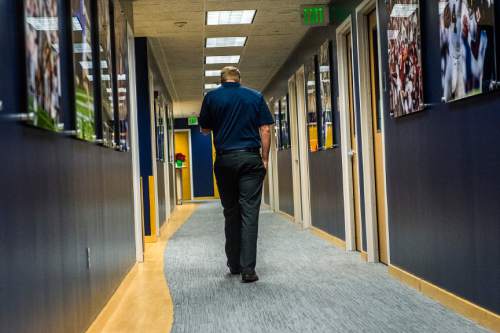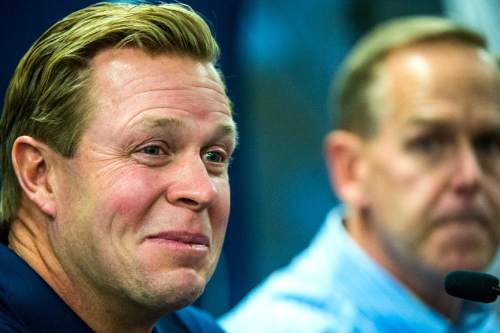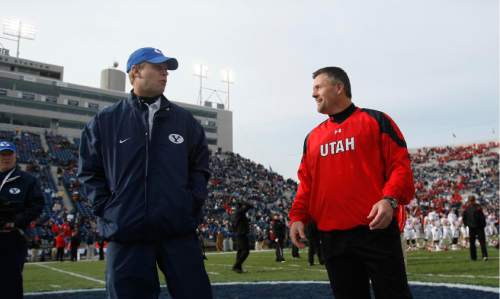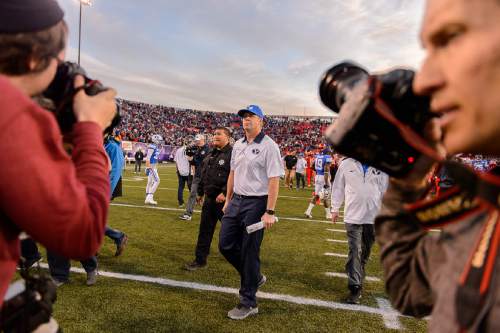This is an archived article that was published on sltrib.com in 2016, and information in the article may be outdated. It is provided only for personal research purposes and may not be reprinted.
In the news conference held outside his office at BYU when he announced he was leaving the school after 11 seasons to become the head football coach at Virginia, Bronco Mendenhall downplayed his dissatisfaction with BYU's football independence as one of the major reasons why he chose to leave.
But in an interview with USA Today's Paul Meyerberg published on Monday, Mendenhall acknowledged it played a more significant role in his decision than he originally let on.
"I don't think it is sustainable," Mendenhall said of independence, echoing what he told The Tribune in a one-on-one interview last spring. "I was trying everything I knew how to do to advance and pioneer that part. If I were to be really blunt about it, I took it as far as I could go in relation to that setting of independence. After all that and setting all that foundation and direction, there became a point where it was guardian, custodian of that direction — where it was, I'm not sure now if I'm one supposed to be doing that here."
Actually, BYU officials have acknowledged football independence is not sustainable in the long term for several years.
On Jan. 29, I asked BYU athletic director Tom Holmoe at his annual roundtable discussion with reporters if that is still the case, and he said it was.
"I think that's probably still true," Holmoe said. "I mean, if you are looking at longterm. I don't think I have to explain this to you, but you can see through legislation, and financial contract and stuff, that there is a divide in the resources. And that's something that is the capital you can build and strengthen your team with is important. And I think that one of the things that was impressive to me was we had a great financial year this past year. And that's a tribute to our fans, getting behind the teams, and to the people who raise money and to our connections with ESPN and such.
"So, I am just feeling very fortunate that, for a year, we made a jump. Some people went backwards, and we went forward. I am only going to look forward. We will push the envelope and do what we can to stay there, and do the things we need to do to remain with a competitive advantage.
"Most of our competitive advantage isn't going to be with money. Our advantage is in other areas — human capital. I love that. I think that's a cool thing. There are teams out there that have a lot of money that can't do anything."
Mendenhall's comments about independence will draw the most attention — and give local sports talk show hosts more fuel to talk about it — but perhaps of greater interest was his description of when he realized his days in Provo were numbered.
"There was a significant change toward the end of last season," Mendenhall said, apparently not divulging what that change was. "It was pretty clear — no, that's an understatement. It was crystal clear that I had done what I was capable of and supposed to do at BYU with the time I was there.
"That had maybe as much or more to do with me coming here as anything else. It was reaching that place internally, and when that was hit it was then, 'OK, so now where?' Then it was, 'this makes sense.'"
Mendenhall told Meyerberg that toward the end of the 2015 season he got the itch to move. It's no secret that his wife, Holly, had become disillusioned with the way she perceived he was treated unfairly by a significant portion of the BYU fan base — which had become frustrated with consecutive mediocre seasons.
"I started to feel like I was not supposed to be the coach at BYU," Mendenhall said. "And that's a personal and specific thing, to either faith or intuition. But I'd never had that feeling before when other options came."
Strangely (or not, considering it was Mendenhall), the coach insisted on sticking around to coach the Cougars in the Las Vegas Bowl, which turned out to be a 35-28 loss to Utah in which the Cougars opened the game like they were playing for a lame duck coach and finished it like they were playing for Vince Lombardi. Holmoe was asked whether he made the right decision in letting Bronco coach that Dec. 19 game in Las Vegas, and he said he did.
"I would do it again," Holmoe said. "I think that Bronco and I for 11 years, we were in the trenches together, literally. I am not going to throw that away, 11 years. I didn't do that to protect him. I did it because I thought it was best for BYU. It was one of those things where maybe another school would have done it differently. 'Hey, this coach did this and this school did this.' I made a decision to do what I thought was best for BYU, and our players. It didn't have anything to do with me at all. I just had to make the decision. And I think that if you look at the game itself, I was wondering if I had made the right decision at the end of the first quarter. But by the end of the game, I was really proud of the way our players and coaches finished off that game. "The ending wasn't what we wanted, but there were a lot of things that go into that decision that are kinda from the heart.
"And there are players and coaches and relationships. I wasn't going to break those between players and coaches. Bronco was not only our head coach, he was our defensive coordinator. I didn't want to go into that bowl game against Utah with one are tied behind our back. We would have been one coach down. Now, if you think I was going to go call the defense, we really would have been in trouble.
So, that wasn't a factor."









